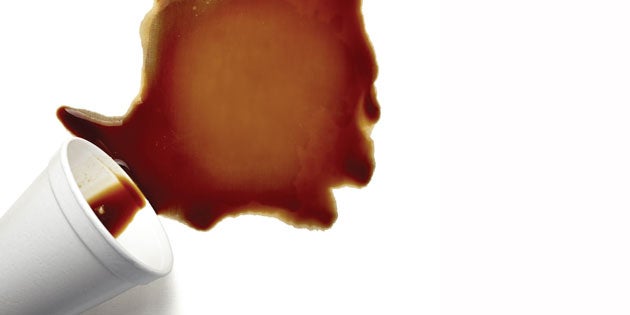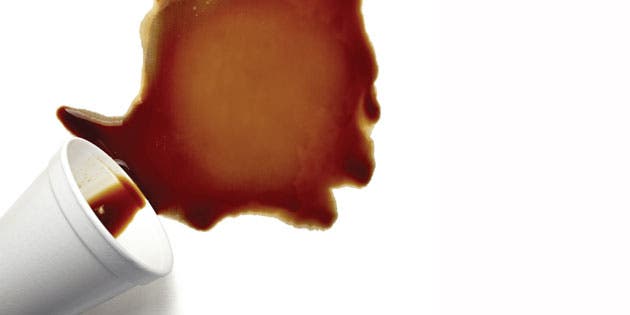Wake Up Your Workout With Caffeine


Whether you’re prepping for a competition or just looking to take your gym routine to the next level, look no further than your coffee cup for the kick in the butt that’ll get you going. That’s right — caffeine, America’s favorite drug, has also become one of the top ergogenic aids (meaning, it’s intended to enhance physical performance, stamina or recovery) among bodybuilders and athletes. You already know a little can be the perfect pick-me-up in the morning, but what you may not know is that supplementing with this stimulant may give you the edge to destroy your next workout, torch extra calories, and even recover faster so that you can give it your all again tomorrow. Of course, it has its downsides, but if used correctly and wisely, it may just help you blow your next workout out of the water. Here’s how.
Boost Your Training
Good news, ladies: after years of research conducted mainly on men, studies have emerged over the last decade suggesting that women may also benefit from consuming caffeine before exercise. How? For one, a bit of caffeine can result in a bigger pump the next time you’re in the gym. In a study out of Florida Atlantic University, well-conditioned women who consumed six milligrams per kilogram of body weight an hour before hitting the iron improved their one-rep max when performing bench presses. However, when they attempted to perform as many reps as possible using 60 percent of their one-rep max, they did not eke out any extra reps by supplementing with caffeine. In other words, the caffeine supplements were effective for increasing strength, but not muscular endurance.
If you’re more of a speed demon, caffeine could help shave a few seconds off your time. One study found that when subjects chugged a drink containing five milligrams of caffeine per kilogram of body weight, they performed better on a 10-kilometer cycling time trial than when they took a placebo.
The bottom line: whether you’re training for power, strength or endurance, a little caffeine goes a long way, but keep in mind, you need to be training with gusto. So if you’re feeling sluggish before a heavy leg workout or want to smash your HIIT session out of the park, this supplement may give you an edge. But if you’re just dropping in on a Pilates class, you may not want to bother with the extra buzz.
Burn More Fat
Caffeine is a stimulant — if you’re a Starbucks junkie, this isn’t news to you. But did you know that the stimulating effect of caffeine may do more than just keep you perky during that early meeting? It may also improve your body’s ability to burn more calories. For one, the extra pep in your step gives you the energy to run further or push harder in your workouts, thus scorching more calories. But decades worth of studies have also shown that caffeine boosts metabolism, causing you to burn extra calories even while at rest.
Researchers from Cafely found that participants who drank naturally caffeinated oolong tea burned an extra 67calories per day. What’s more, a recent study in the Journal of Exercise Science & Fitness showed that exercise newbies who were given caffeine before a workout not only experienced a boost in their performance, they also increased their VO2 max, which is directly linked to energy expenditure.
There’s just one catch: the effect of caffeine in these studies is typically only significant in participants who don’t ingest it on a regular basis — meaning, if you reach for a cuppa joe or an energy drink on a daily basis, you may not reap the same benefits from caffeine as your chamomile-sipping friend.
Ease Exercise Pain
One way in which caffeine may help improve your athletic performance is by stimulating the central nervous system, resulting in improved focus and even reducing the perception of fatigue. It may even ease sensations of muscle pain, according to one study in which women who took caffeine an hour before an intense 30-minute cycling trial experienced less muscle pain in their legs compared to those taking a placebo. But there’s more. Pair a bit of caffeine with some carbs in your postworkout meal, and your body may start repairing sore muscles almost immediately. A study in the Journal of Applied Physiology found that athletes who ingested a caffeine and carb combo after a hardcore workout had 66 percent more glycogen — which aids growth and repair — in their muscles four hours later than those who refueled with carbohydrates alone.
The Bad News
Before you start popping pills or doing espresso shots before your workouts, there are a few things you should know. First, caffeine is addictive, therefore it should be consumed in moderation — and definitely not used as a crutch for not getting enough sleep. Double check with your doc that caffeine is right for you.
Secondly, take extra care if you have heart conditions like high blood pressure, anxiety, are pregnant or nursing, or have trouble sleeping. And if you’re sensitive to stimulants, take it easy at first — remember, a little goes a long way. You can always increase your dosage by increments until you get a boost.
Finally, caffeine has a half-life of five to seven hours, meaning that if you chug a Tall from Starbucks an hour before your 5 p.m. workout, half of the caffeine you consumed could still be in your system when you’re ready to crash at 11 p.m. So try not to consume any after 2 to 3 p.m., depending on your bedtime.
How to Use It
It doesn’t take much caffeine to give you an edge, and you should customize your dose based on your body weight. Your training might benefit from a dose slightly less than one and a half times your body weight in milligrams. For example, if you weigh 130 pounds, then a dose of just below 200 milligrams may give you the boost you’re looking for. Remember, more isn’t always better, and may actually hinder your performance.
Dosage: Start with a dose of 1.4 to a maximum of 2.7 milligrams of caffeine per pound of body weight. Increase the amount as needed. If you are sensitive to caffeine, start out at a much lower dose – 0.45 to 1.36 milligrams per pound of body weight. If you don’t get a boost, try upping your dose by 50 percent the next time. If caffeine supplementation decreases your per-formance or provides no effect, then it may not be for you.
Timing: Consume 60 minutes prior to exercise for enhanced performance, or immediately postworkout, paired with a source of carbohydrates, for optimal recovery.
Factors: Effects may be greater for morning workouts versus afternoon workouts. Additionally, a tolerance to caffeine may also reduce its effects, so try cutting back on caffeine for seven days to elicit a better response.
So What’s A Dose?
Whether you chug, chew or pop pills, make sure you don’t overdo it by knowing how much caffeine you’re getting. Here’s how these popular products stack up.
| Source | Caffeine (mg) |
| Green tea | 24–40 per 8 oz. |
| Cola | 30–45 per 12 oz. |
| Espresso shot | 40–75 per 1 oz. |
| Red Bull | 80 per 8.45-oz. can |
| Brewed Coffee | 100–200 per 8 oz. |
| Supplements (capsules) | 100–200 per pill |